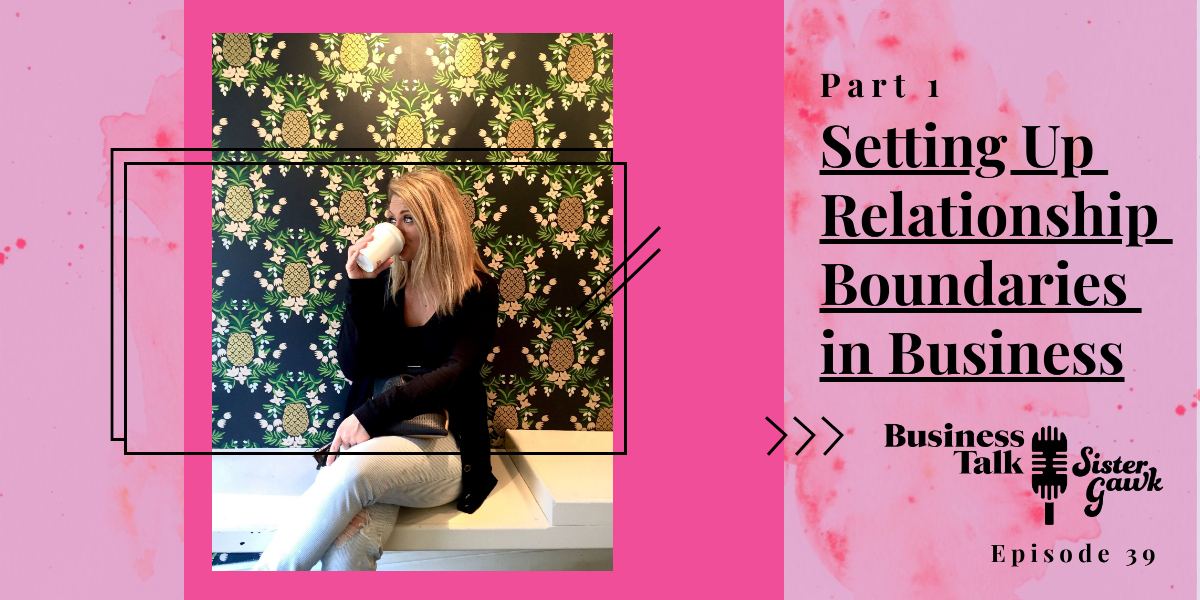Welcome to Business Talk Sister Gawk! I’m Bekkah! And I’m Ruthie! And today we are going to be starting a two-part series on relationship boundaries in business.
Ruthie: Yeah we are! *Laughs because I always feel that need to say something following Bekkah’s intro… facepalm*
Bekkah: I love how like literally every episode you just start laughing at the beginning before we even start.
Ruthie: I always am like, “What do I say?” And I just feel like I need to. My hype man personality wants to be like, “Heck yeah! Let’s go!” And I like have to refrain.
Bekkah: Okay yeah, Ruthie, does not like silence.
Ruthie: It’s true! I’ve got hold music that I do it’s usually the Ring of Fire or the Indiana Jones theme song.
Bekkah: For like every part of her life whenever there’s silent.
Ruthie: Seriously, whenever I’m like turning or something like that or trying to give directions *sings Indiana Jones theme song as proof*
Develop a Business Standard For Yourself of What is Personal & What is Professional
Bekkah: Okay, the first part we’re going to talk about is what’s the line in personal and professional. You need to set one and I definitely think that this is something that we talk about a lot, especially, with our podcast because we talk about a lot of personal stuff but where’s the line of what’s okay to talk about. In different industries, it’s going to be very different. Especially for small businesses what you’ll find is a lot more of that personal bleeds in the professional. The reason for that is because most of the time those people are a family-run business and when you’re with your family there’s a lot of stuff that comes out that is definitely personal.
Know What is Okay and Not Okay to Share in Business
Understanding those aspects of what is okay to share and what is not okay to share. I would say that this is something that most people who are not stoic, reserved individuals naturally really struggle with.
Ruthie: Guilty and I think also taking into account too, what is your family okay with you sharing? There are definitely times when we share things on the podcast that we check with our family beforehand. “Is this okay if we talk about this?” And then sometimes they say “no” and so then we don’t. I think like knowing for yourself like, “Would my wife be okay with me telling this story to a client?” Hmm maybe not. So don’t share that.
Bekkah: I think, too, there’s sometimes people try to share things to create camaraderie – big word. Developing a relationship with someone else that they want to share something because they think it’s going to increase that relationship or like identification with that other person and sometimes people do cross the line in that. It is a good thing to call people out when they do that in some ways especially if it’s something inappropriate. But you should never share everything about your business with other people. This is something that I think a lot of young entrepreneurs really struggle with at first. Especially if you’re a verbal processor, you’re trying to talk through all this stuff about your business and I recently had a conversation or was in a group with somebody who was just everything about their conversation was about business and I realized that I really didn’t care about what’s going on in that.
There Will Be Difficult Moments in Your Business That Shouldn’t Be Public Information
Not necessarily that I didn’t care about their business or that person, but really what it was was I all of a sudden had this revelation that “Oh my goodness some people don’t care about business and I need to stop talking about it all the time.” Even though it’s my passion that’s not something that everyone else always wants to hear about. What does that look like to create good relationships where you’re not always talking about work? There are moments that your business is going to be very difficult, but not everything about that difficulty should be public information.
Ruthie: I know you said that you’re working on that stuff, but I think that you’re doing a very good job at it, honestly, because there are times when you’ll tell me stuff that you’ve been working on for months and I’m like, “You have!? What!? That’s amazing!” So I do think that there – I know that you’re working on that but I’ve seen that in your life and I think that’s cool! So good job!”
Know Which Business Ideas Are Good to Share and When is The Right Timing to Share Them
Bekkah: Well, I definitely think that there have been other things that have happened in my life that have really pushed me to think about that but it’s really important to practice. I really mean that from the beginning learning when it’s okay to share something because I know as a person who has 100 ideas a day I could say, “Oh! I’m going to do all these things!” But I know that when I start there and I’ve done this many times where I’m like, “Yeah! I’m really passionate about this!” or whatever I’ve told a few people and they’re like, “Yeah! I really want to support you in that!” And they’re trying to find me resources or whatever and then when I decide, “Oh my goodness this is a tactical switch I need to make because that’s just not gonna work,” it really throws other people through a loop because they’re like, “Oh, well, you’re not doing this anymore? I was trying to be helpful.”
I appreciate that like they’re really, really trying to network for me, but I want to make sure that I’m not blowing off their suggestions if they’re really trying to help me and I should really only bring to the table the things that I do need help with. Because otherwise, you’re sending everyone on wild goose chases.
Know Who to Verbal Process with & If It Can Help You Resolve Business Thoughts
Ruthie: Or at least be very clear like, “This is still something I’m processing,” or, “Let me verbally process with you.” Bekkah and I (if you haven’t noticed) are extreme verbal processors so we do most of our thinking outside of our heads. It just comes out of our mouths like, “Wow! I didn’t know I was thinking that!” Which kind of leads me to self-reflection like Bekkah was talking about. Practicing this and then, I do tend to overthink things, that’s something we’re gonna talk about later but just acknowledging that it’s okay to look at the situation that just happened whether you felt like, “Maybe I shared a little bit too much in that.” Even asking yourself that question. “Did I share too much in this situation?” And self-reflecting of like, “Okay, next time I’m not going to say that,” or, “Okay next time I’m going to do X, Y, or Z or to be able to kind of reroute the conversation back to where you do feel comfortable.
Emotional Intelligence Can Help You Set Boundaries With Other People in Business
Bekkah: And I think that in different cultural contexts, too, people expect different things of you. Be versatile and understanding that there are certain industries or groups of people that you’ll work with that expect more of that personal side of your life, because that is a part of genuine trust and they’re not going to trust people that they don’t know anything about.
Ruthie: There’s also a side of business where they do not expect that at all. Maybe when you start sharing about your personal life they’re like, “Why are you telling me this right now?”
Bekkah: And they’re incredibly uncomfortable.
Ruthie: Or they’re like, “This is a waste of time. Get back on task.” You know?
Never Share Personal Information About Clients as a Business Owner
Bekkah: Yeah and that really comes down to understanding how to read the room. Ruthie was talking about that earlier. When we’re talking about our relationship boundaries in business there is a lot of stuff that you will find especially if you start doing any kind of work with bigger companies or whatever or even in healthcare. There’s HIPAA stuff. What’s called an NDA, which is a Non-Disclosure Agreement regarding privacy. We’ve talked about privacy a little bit in terms of data and what you can disclose and not disclose of people’s personal information. But really in terms of the projects you’re working on, too. It is not appropriate to share what you did for someone and how it went for them in sharing any kind of numbers or anything like that where you don’t have that person’s permission.
Ruthie: Or even for me working with individuals on their finances and working in coaching and things like that I don’t share with people who I’ve worked with. If I talk about like, “Oh, I had a meeting with a client today.” I won’t even tell people who I met with, because that’s a breach in privacy, a breach in confidentiality. I don’t even talk about that. It’s okay to learn from situations and be able to communicate that with other people. You can be vague and still communicate clearly but that’s definitely something that you need to practice.
It’s okay to kind of like, “Wow! This is a really valuable thing that I learned!” And then kind of rehearse how would I communicate that with somebody else to be able to add value to their life and be able to share something that I’ve learned from this because I don’t want anybody else to go through that. It’s okay to kind of rehearse that in your head and maybe audit out – “audit”? “Omit”? Omit! Out to things that are personal details that you shouldn’t share with someone.
Bekkah: Yeah and when we’re talking about that I mean there are lots of times that we’ve had examples of one time the situation happened to someone and here’s what happened in this situation, but it doesn’t need to be the exact details of everything. Still you can communicate a clear point and what I want to really say, especially as you start working with other business owners and stuff, if you’re not contracted with them to do things or whatever you don’t need to know the “why” of everything. You don’t always need to know “but why”. I’ve learned that very slowly as I’ve been gracefully slapped upside the head by many people. And you know what I’ve also learned in that is the way that other people respond to those questions I think I’ve learned a lot of good responses.
Be Prepared to Respond to Questions that You Should Not Answer
If someone ever pointedly – there are some things that are just inappropriate to ever ask of someone and I’ve had a couple of those questions where I know that in this situation if they ask me point blank I need to have a response. If someone looks at me and says, “Well, how much money do you make?” Or something like that which I’ve seen people do to businesses and I’ve seen people ask, “What’s your profit margin?” in certain areas and that’s just not an appropriate question. The reason for that is nobody needs to know that. That’s their personal finance information that’s why Ruthie doesn’t even talk about who she meets with. Because sometimes, in her position, she’s actually asking those questions because they have asked her to review that information, but it’s very personal to some people.
Ruthie: What would be a response that you would have to someone if they asked, “How much money did you make this year?” What would your canned response be?
Bekkah: I would say, “Enough that I am blessed.” There’s a good way to gracefully get out of those situations, but at the same time be like, “That’s none of your business.”
Ruthie: I feel like that communicates that. You responding that without using the actual words “it’s none of your business.”
Bekkah: Yeah, no, I think it is! But I think there are other things that you really need to understand the relationship of boundaries of business that there are other questions that people will ask you that is really none of their business. Like, “Who are you working with right now?” In those situations it is completely okay to say, “You know, I’m not at liberty to discuss that.” That is an okay thing to get gracefully slapped upside the head about because people need to know that they don’t need to know everything.
Ruthie: Yeah and in that conversation, too, more often than not the people who would ask those questions if you responded in that way, one of two things could happen. They could say, “Oh! Sorry, yeah, you’re right! You don’t need to tell me that.” Or, two, they could say, “Oh, okay!” And get offended and then you should know I need to draw a boundary with this person because they’re going to ask too many questions. I don’t want to be in a relationship with them. In a business relationship or any kind of relationship because they’re trying to get me to discuss things that I shouldn’t be discussing. Acknowledging that and being able to say, “Okay, they’re pushing me too far.” I need to – depending on what their response is – I need to distance myself or just move on.
Bekkah: Well, I think another thing it’s important to recognize is a lot of people will ask you things like, “How’s business been?” That’s a really common thing for people to do. I love this one, especially, when I’ve seen people who are really having a hard time with, maybe they’re trying to figure out their finances or whatever and they don’t want to say, “You know, customers have been slow or whatever.” It’s always good to ask, you know, “Where are my blessings? Where have I learned and grown and got richer in relationships or knowledge?” And just say, “You know what? It’s been a good year!” When people ask you, “How’s business?” “It has been a good year.”
Any time that you’re growing it’s been a good year! That is not a lie and I think it’s really important to know that you should never put yourself in an ethical situation where you should lie. I think that it’s really important to think about how to phrase those questions because they’re going to come. If you realize that you’re putting yourself in a place where you’re telling a white lie or a big lie that is not okay and that’s not reflective of what you want to become if you want to be a good business person.
Have Clear Personal & Business Standards With Those You Work With
Bekkah: The next thing we want to talk about is relationships with other people in terms of having someone who’s really good at something but maybe they have some character flaws that you’re not okay with working with them and setting those boundaries.
It’s really important to acknowledge that someone is very good at something. I’m not saying you have to go out of your way to do that but it’s okay to value those characteristics of people and knowing when to reserve the right to recommend that person or not recommend them.
Ruthie: It’s okay to look at someone and say, “Wow! They are so good at that, but I do not want to work with them.” You know and you don’t have to work with every single expert on every single thing, you can be picky and choosy. I shouldn’t have said “picky and choosy”… You could be “picky”.
Bekkah: Well, think about when we’re talking about setting boundaries. I think that there are people that I know that are just wonderful individuals and I value them but there are some follow-through things that I just do not want to work with them. Because I know that, as an individual, they’re working through a lot of stuff and they’re not going to be able to be timely in the manner that I need them to be in order to be successful for whoever I’m working with. Know that your word is valuable and anyone that you recommend for something is a reflection of your character as well.
It’s really, really important, like we talked about in our last podcast, people are going to be testing you, you should be testing people in terms of is this person true to their word? Do they get their job done? And is it professional in how they’re communicating? In general, we’re gonna talk about personal boundaries of professionalism a little bit later. You could be affirming to people without being too nice and Ruthie’s going to talk a little bit about this in terms of that boundary for business.
Practice How You Communicate Compliments to Other People to Ensure You Don’t Overstep a Relational Boundary
Ruthie: I think it’s something I’m learning in business and then also learning in my personal life is that I just get really excited about people. When they do cool things I’m just like, “Wow! You are so cool!” Then I get really like – just excited! For what they’re doing or who they are or whatever. I was talking with my brother Aaron about this and he was like, “Ruthie, you are too nice. You can say a compliment and just leave it.” And my problem is because I’m a verbal processor I’m like, “Wow! You’re so good at this and let me tell you all the reasons why I think that!”
And then I just go off and say all these different things. There’s something to just being able to compliment someone like, “Wow! You did a very good job at that.” And then leaving it. Or like, “This person is really, really good at business.” Or “This person is really, really good at whatever,” and then just leaving it and not feeling like you need to justify your compliment. I think that’s something I really struggle with. Not necessarily justifying it but I just go too far in my compliments a lot because I just get so excited and I feel like it’s not finished! Like there’s so much more I could say!
Bekkah: But sometimes that leads people to feel uncomfortable.
Ruthie: Yeah.
Bekkah: And then it does the reverse effect of like, “You need to stop. I’m getting embarrassed.”
Ruthie: “You gotta calm down!”
Bekkah: And I’m going to say, on the other side of that, it is okay to draw a boundary with people when they’re clearly not being accountable.
Ruthie: Explain to me what you mean by that.
Practice Being Clear and Concise in Your Confrontations in Business
Bekkah: What I mean by that is if you have someone that you’ve contracted, like say, for example, you’re hiring someone to do something for your business and they’re not doing their job. You do not need to sugarcoat things all the time. I think that’s the reverse of what Ruthie is talking about in terms of she’s got to really work on being concise about her affirmation, you need to really work on being concise about your confrontation. And not apologizing for confrontation because it’s a part of business and it’s a part of healthy conflict and helping other people become better business people as well.
If you’re saying, “Hey, you know, I want to hire you for this, but here’s what I need to see in order for this to be successful.” And clearly laying out your boundaries in which they need to function because maybe you do have reservation that you’ve worked with where there’s just one character trait that they’re really not good at and you need to be very clear “I recognize this in you and this could be detrimental to this project and so therefore if you feel uncomfortable being able to meet this qualification, please, tell me and I will find someone else.” And some people will evaluate it. There are really good business owners out there that if they’re self-reflective they’ll say, “You know what? You’re right. I recognize I won’t be able to get this done in the timeline that you need, can you please ask someone else.”
Ruthie: “But keep me in the mind.”
Bekkah: “But keep me in mind in the future.” Yeah. I think that that’s an okay thing to say and it’s not necessarily always a character trait. Sometimes people are just really good at their job and they don’t have the capacity to take on more work.
Understand Your Personal Capacity and Do Not Over-Commit to Things in Your Business
Ruthie: I think that with that too, on the other side of that, you’re asking other people and having that boundary of knowing what they’re good at but then also knowing yourself and what boundaries you need to draw for yourself. Maybe there’s a super cool project and you want to be a part of it but you’re like, “You know what? This is a boundary I need to draw for myself.” Maybe my kid just had surgery. That’s a real thing when you’re a small business owner. Your family is a big part of your life and that can affect a lot. When you say, “There are a lot of things that are happening right now in my life that I just need to draw a line right here and kind of back away from these different things.” But the important part of that is communicating clearly with the people that are involved and saying, “Here’s why I can’t do this. Please, keep in mind in the future, but I can’t do that right now. I would love to be a part of it. Sounds really cool, but I can’t do it right now.” That’s a boundary that you can draw for yourself.
Bekkah: And I think that when people are like, “Oh, well, that’s personal information! Can I share that?” Yes, you can.
Ruthie: If you feel comfortable.
Know That You Always Have a Choice in What and What Not to Share
Bekkah: That’s your choice. If you feel comfortable that’s your choice. There are situations that I have been in where people have pressed me to say why can you not? I remember a specific situation in which somebody was very concerned about how much I was traveling in my personal time. And they were demanding to know why. I really did not think it was any of their business. It was a really hard thing for me to withhold that because I did not need them to accommodate me because at the time my grandpa had cancer and was dying.
I was traveling a lot to support my mom and my grandma. They just did not need to know that and if they weren’t happy with my ability to do my job and they were more concerned about what I was doing in my spare time that wasn’t allowing them to have full control of my schedule, then I did not need to be in relationship with that person. I did choose to withhold that information and if they still were not happy with knowing what all that was going on in my life, that’s their problem. We’re gonna transition into our gawk portion because we’re gonna do another episode on this you guys. Oh! I’m so excited!




